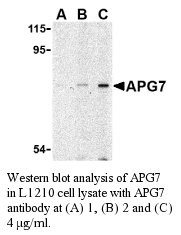Anti-Human Autophagy protein 7 (NT) (APG7)
Data
- -
- -
Antibody DetailsProduct DetailsReactive Species Human Host Species Rabbit Immunogen PN:A260 Product Concentration 0.5 mg/ml Formulation This polyclonal antibody is formulated in phosphate buffered saline (PBS) pH 7.4 containing 0.02% sodium azide as a preservative. Storage and Handling This polyclonal antibody is stable for at least one week when stored at 2-8°C. For long term storage, aliquot in working volumes without diluting and store at –20°C in a manual defrost freezer. Avoid Repeated Freeze Thaw Cycles. Country of Origin USA Shipping Next Day Ambient RRIDAB_2828075 Each investigator should determine their own optimal working dilution for specific applications. See directions on lot specific datasheets, as information may periodically change. DescriptionSpecificity Rabbit Anti-Human Autophagy protein 7 (NT) (APG7) recognizes an epitope near the N-terminus of human and mouse APG7. This polyclonal antibody was purified using affinity chromatography. Background Autophagy, the process of bulk degradation of cellular proteins through an autophagosomic-lysosomal pathway is important for normal growth control and may be defective in tumor cells. It is involved in the preservation of cellular nutrients under starvation conditions as well as the normal turnover of cytosolic components.1,2 This process is negatively regulated by TOR (Target of rapamycin) through phosphorylation of autophagy protein APG1.3 Another member of the autophagy family of proteins is APG7 which was identified in yeast as a ubiquitin-E1-like enzyme; this function is conserved in the mammalian homolog.4 In mammalian cells, APG7 is essential for autophagy conjugation systems, autophagosome formation, starvation-induced bulk degradation of proteins and organelles.5 It has been suggested that caspase-8 may alter APG7 levels and thus the APG7 program of autophagic cell death.6 Antigen DetailsPubMed References & Citations1. Gozuacik, D. and Kimchi, A. (2004) Oncogene. 23:2891-906. 2. Kisen, GO. et al. (1993) Carcinogenesis 14:2501-5. 3. Kamada, Y. et al. (2000) J. Cell. Biol. 150:1507-13. 4. Mizushima, N. et al. (1998) Nature 395:395-8. Technical Protocols |
Related Products
 Products are for research use only. Not for use in diagnostic or therapeutic procedures.
Products are for research use only. Not for use in diagnostic or therapeutic procedures.



